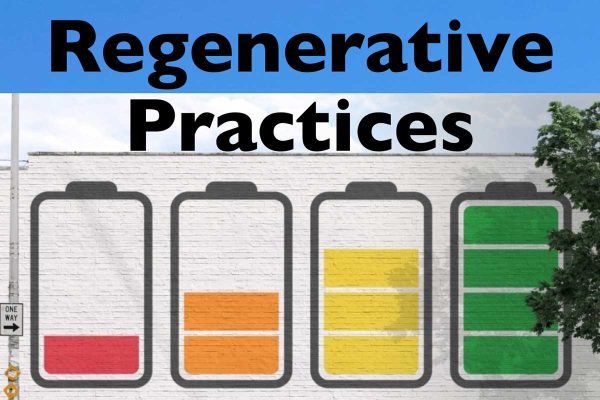I’ve been thinking a lot recently about what helps us get through hard times. So much so, in fact, that I’ve decided to reorientate the work of CollegeOfWellbeing.com to make that its central focus.
I’d love to share a bit about two closely related themes I’m finding helpful here: Regenerative Practices and Thrutopian Wellbeing.
Regenerative Practices

If you struggle with personal energy and the experience of feeling drained, know you’re not alone. ‘The Great Exhaustion’ is a term increasingly used to describe widespread fatigue, particularly that linked to work stress, economic insecurity and concerns about our world. A starting point in tackling tiredness is just to acknowledge it as an issue – and not just a personal one, but also as a larger collective challenge many of us share.
When I went through a difficult burnout years ago, I thought I had much in common with over-farmed fields that lose their topsoil and fertility. In my overshoot and collapse, I felt like a desert, all dried up. I left my job as a medical doctor, and worked for a while growing fruit and veg in an organic garden. Regenerative agriculture aims to give back to the soil, rather than just taking. Regenerative practices aim for something similar with our personal energy – looking at how we recharge, refresh and restore ourselves, rather than pushing for more when we’re feeling used up.
What would it be like if we had a collective shift towards regenerative culture? What would it be like if we applied regenerative design in our planning, not just with agriculture, but in our personal and work lives too? As a step in this direction, I’ve teamed up with my friend and colleague Madeleine Young to develop a three hour online workshop introducing, and inviting engagement with, Regenerative Practices for Personal Energy and Wellbeing. We had our first workshop in August.
Thrutopian Wellbeing
In my last post, I introduced ‘Project Thrutopia’ as the project of finding a way through difficult times in the best possible fashion. Thrutopian storylines can be applied at many different levels – whether in our personal lives, in situations where we’re supporting others, and with facing larger shared challenges like the climate crisis. In any of these situations, wellbeing becomes more relevant, because there’s a context of challenge to bring our best selves to, so that we can play our part in helping a better version of how things might develop become more likely.
By improving the state we’re in, wellbeing practices, like the regenerative practices mentioned above, can strengthen our capacity to contribute to positive change. Being engaged in thrutopian activity can also be good for our wellbeing. It makes our lives more meaningful and satisfying, and if we’re able to improve conditions, others benefit too. So these two help each other, as the image below suggests.

‘Thrutopian Wellbeing’ brings together elements too often separated – such as personal and collective wellbeing, resilience and change-making skills, sustainability and cultivating satisfaction in life. But how do we apply this in practice? A group of us have been working on designing a wellbeing practice system that brings together these different elements. We call it Su Ha – because it brings together SUstainability and the psychology of HAppiness.
If you’d like to find out more, you can view recordings of our webinar Su Ha Moves for Thrutopian Wellbeing on this website.
If you’d like to go deeper with this approach, our next 8-week Su Ha Training starts on Tues 18 March 2025.